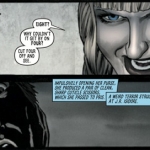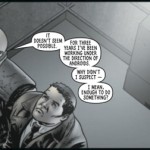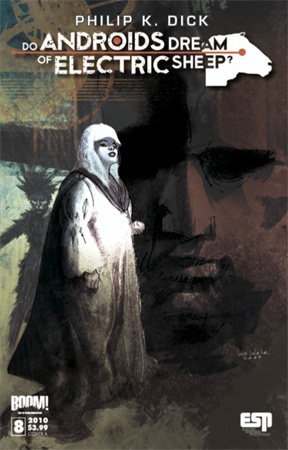
Issue: Do Androids Dream of Electric Sheep? #8
Release Date: January 27, 2010
Writer: Philip K. Dick
Artist: Tony Parker
Colors: Blond
Covers: Brett Weldele, Scott Keating
Letterer: Richard Starkings of COMICRAFT
Backmatter: Richard Starkings
Publisher: BOOM! Studios
The more I read this graphic novel version of Do Androids Dream of Electric Sheep?, the more I keep telling myself I have to read the original novel. I admit I haven’t even gotten a copy yet, but I swear it’s on my bucket list. I might even become a Philip K. Dick fan. I say “might” instead of “will” because he’s a dystopian-we-are-all-doomed type of writer, which I usually don’t like. But perhaps I could make an exception.
I am starting to think that fans of the novel will like this version. At first I wasn’t sure whether reading the novel would ruin the graphic novel, kind of like when you go to a movie and can’t get over how the movie version doesn’t do justice to the original novel it’s based on. I still am not sure, seeing as how I haven’t actually read the novel (or anything by PKD). But my suspicions are leaning more towards the enjoyment side of the equation.
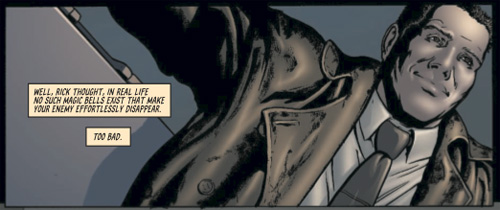
I say this because I am enjoying how different this format is from Blade Runner (which is loosely based on the novel). Part of it is the look BOOM! has chosen for the characters. In the movie, our protagonist is played by Harrison Ford. In this version, he is of mixed ethnicity. Also, our hero has a childlike quality that contrasts with his dangerous job. He’s kind of bright-eyed little boy and cynical bounty hunter all rolled up into one, while in the movie, Harrison plays him largely as a burnt-out cynic.
The contrast between movie and graphic novel is fun, at least for me. I’m wondering if the novel presents yet another version of Deckard. But enough of that. Let’s get on to the plot: In our previous installment, Deckard killed one of the Androids, barely escaping with his life, then called his wife only to realize she’s basically nuts, and then speculate about doing it with Android chicks.
In this installment, Deckard observes an opera rehearsal (Mozart’s The Magic Flute). It turns out Deckard loves The Magic Flute, so he sits to enjoy the show, thinking about mortality and dying young, and all the issues that Mozart doesn’t cause the rest of us to speculate about but in Deckard’s case it’s totally in character.
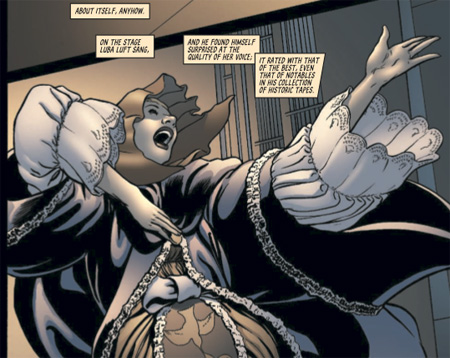
The next Android on his hit list is Luba Luft. She’s a female, and she is playing the role of Pamina, which is why Deckard’s at the opera. Watching her rehearse gives Deckard a chance to think about all kinds of things that contrast the human qualities of Luba with the fact that she’s an Android. And the fact that he’s about to assassinate her builds some tension too. It’s great story telling. First, PKD shows us how human she is, and has our hero be the one who points out her human qualities to us, just before he kills her for not being human. I guess PKD was pretty good at his craft after all.
Anyway, he has to administer the test to figure out whether Luba really is an Android. He heads to her dressing room where she starts speculating that perhaps Deckard is an Android. And it’s pretty convincing stuff. “Androids don’t care what happens to other Androids,” Deckard declares. Then Luba asserts Deckard must be an Android, seeing as how his job is to kill Androids and only a person who doesn’t care about Androids would be willing to kill Androids.
Furthermore, explains Luba, his memories could be false memories. Maybe there once was a real Deckard, but the Android Deckard killed him and took his place and installed false memories.
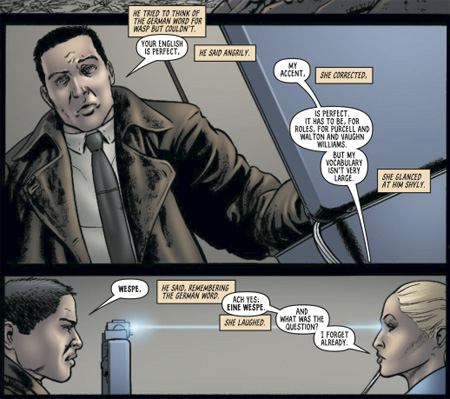
I’m pretty much sold on the idea, but not Deckard. He tries to administer the test, but she keeps on interrupting him and not understanding the questions and going off on tangents that have no relation to the subject being discussed. Kind of like a hostile witness at a trial. Or like I used to behave back in college at about 10:30 on a Friday night when they had one dollar mixed drink specials.
So he can’t get a read on whether she’s an Android, but it doesn’t matter because pretty soon she sticks a gun in his face. That’s the end of this installment.
The commentary at the end by Richard Starkings is titled “Chick Lit & Chick Flick.” It’s pretty interesting, and you don’t have to be a PKD fan to enjoy it, unlike some previous efforts. So, that’s good.
Rating: 3.5 / 5 Stars


